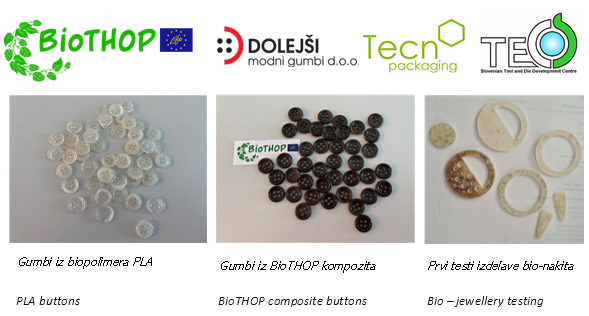SLO Podjetje TECNOPACKAGING s sedežem v Zaragozi, Španija, je tekom projekta LIFE BioTHOP razvilo novo materialno formulacijo na osnovi biopolimera mlečne kisline (PLA) in odpadnih vlaken hmelja, ki ga je v tem letu testiralo lokalno podjetje DOLEJŠI modni gumbi d.o.o. iz Šempetra v Spodnji Savinjski dolini. V sodelovanju s partnerjem TECOS iz Celja so izdelali prve biopolimerne gumbe ojačane z vlakni hmelja. Le ti na žalost niso prestali zahtevanih temperaturnih nihanj, saj je material PLA vzdržen za maksimalna temperaturna območja do 6o stopinj Celzija – kar pa je prednost pri razvoju hmeljarske vrvice, saj se v kompostnih kupih pri taki temperaturi in ob prisotnosti vlage ter mikroorganizmov razgradi do biomase, vode in CO2. Gumbi pa za svoje svojo aplikativno funkcionalnost zahtevajo material, ki je temperaturno odporen na večkratno pranje ter likanje. DOLEJŠI modni gumbi nad uvajanjem biomaterialov še niso obupali in sedaj nove priložnosti za validacijo tega materiala iščejo pri izdelavi nakita svoje lastne znamke. Še nekaj drugih izdelkov iz naših novih BioTHOP materialov pa želijo preiskusiti tudi druga podjetja v Evropi, o čemer trenutno tečejo pogajanja in validacijska testiranja.
EN Within the LIFE BioTHOP project, TECNOPACKAGING, from Zaragoza, Spain, developed a new material formulation based on biopolymer of lactic acid (PLA) and waste hop fibre, which was tested this year by the local company DOLEJŠI modni gumbi (fashion buttons) from Šempeter in the Lower Savinja Valley. In cooperation with the partner TECOS from Celje, they produced the first biopolymer buttons reinforced with hop fibre. Unfortunately, they did not withstand the required temperature fluctuations, as the PLA material is resistant to maximum temperature ranges up to 60 degrees Celsius – which is an advantage in the development of hop twine, as in compost heaps at such temperatures and in the presence of moisture and microorganisms decomposes to compost, water and CO2. Buttons, for their application functionality, require a material that is temperature resistant to repeated washing and ironing. The company has not given up on the introduction of biomaterials, they are looking for new opportunities to validate this material in the production of jewellery of their own brand. A few other products from our new BioTHOP materials are also being tested by other companies in Europe, which are currently under negotiation and validation.

